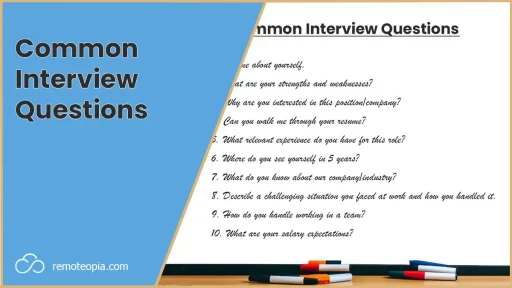
Understanding Remote Jobs
First, let’s take a look at the typical remote roles that are available with no experience required and what challenges and benefits can come with them.
A lot of remote roles offer the flexibility to work from home, co-working spaces, or even while traveling, as long as you have a reliable internet connection.
Remote Jobs That Require No Experience & No Degree
The digital age has opened the door to a variety of remote jobs where you can begin your career without prior experience or a degree. Here are some positions worth considering:
| Remote Job | Average Salary | Find Jobs |
|---|---|---|
| Social Media | $49,500/£34,650 | View Jobs |
| Online Testing | $37,500/£28,600 | View Jobs |
| Graphic Design | $55,000/£39,600 | View Jobs |
| Translator | $55,000/£39,600 | View Jobs |
| Tutoring | $41.25/£33.00 PH | View Jobs |
| Copywriting | $55,500/£39,600 | View Jobs |
| Data Entry | $37,500/£28,600 | View Jobs |
| Online Research Assistant | $44,000/£33,000 | View Jobs |
| Online Surveys | $11/£8.80 PH | View Jobs |
Soft skills required for remote jobs:
- Self-discipline: Working remotely demands a high level of self-motivation and time management.
- Communication: Without face-to-face interaction, communication needs to be concise and regular.
- Technical Understanding: A stable internet connection is crucial, and you need to be adept at troubleshooting minor technical problems.
When looking for remote jobs with no experience, it’s important to focus on roles that match your existing skill set, and rely on soft skills. Be diligent when it comes to these factors in your search.
Finding No Experience Remote Jobs

Entering the remote workforce can seem daunting without experience, but there are specified channels to explore that can lead you to suitable opportunities.
Job Boards
Job boards are a treasure trove for remote job listings, including those that welcome applicants with no prior experience.
Sites like FlexJobs cater to a broad range of industries and experience levels. Filtering options allow you to search specifically for entry-level and no-experience remote positions.
- Best Practices:
- Use the search filters such as “remote” and “entry-level”.
- Create job alerts for new postings that match your criteria.
Social Media Platforms
Platforms such as LinkedIn showcase a variety of remote jobs that require no experience.
By following companies of interest and joining industry groups, you can increase your visibility and likelihood of discovering entry-level remote roles.
- Tips for Engagement:
- Network by engaging with posts and sharing your career interests.
- Clearly indicate you’re seeking remote opportunities in your profile.
Company Career Pages
Many companies post job openings on their own websites. If you have a list of target companies, visit their career pages regularly to find remote roles suitable for those without prior work experience.
- Action Steps:
- Bookmark the careers pages of companies you admire.
- Sign up for job notifications if the feature is available.
Entry Level Remote Jobs No Experience
Finding entry-level remote jobs that require no previous work experience can be the stepping stone you need to launch your career from the comfort of your home.
Industries like customer service, data entry, and even certain tech positions offer such opportunities.
Remember, persistence is key.
Entry-level jobs are competitive, but with the right approach, you can find a remote position that serves as a valuable first step in your career path.
Preparing Your Application
Before applying for remote jobs, it is crucial to have a well-crafted application.
Your resume and cover letter are integral tools in showcasing your abilities and making a strong first impression on potential employers.
Crafting a Compelling Resume
Your resume should be tailored to demonstrate skills that match the remote job you are targeting.
Start by listing your contact information clearly at the top.
Include any relevant skills and tools you’re proficient with that are commonly used in remote work settings, such as Zoom, Slack, or Trello.
If you lack direct experience, highlight transferable skills such as time management, communication, and self-motivation which are all highly valued in remote positions.
- Education: List your latest educational achievements.
- Skills: Focus on those applicable to remote work.
- Projects: Include any relevant work or projects, even personal ones, that showcase your abilities.
Remember, while maintaining brevity, use bullet points to make the information easily digestible.
Writing a Cover Letter
When you write a cover letter, make it specific to the job and company.
Start by addressing the hiring manager by name if possible, as this adds a personal touch.
Explain why you’re interested in the role and how your skills make you a suitable candidate.
If you don’t have too many skills relatable to the role – make sure you highlight your enthusiasm to learn and demonstrate an understanding of the company and what they do.
About Us and Company Mission pages are great for finding this sort of information.
A good structure to your cover letter could look something like:
- Introduction: Capture the employer’s attention.
- Body: Build the case for why you’re the right fit for the job.
- Conclusion: End with a strong closing statement.
The cover letter is your opportunity to explain the value you can add to the company, even without prior remote work experience.
It is also here that you can elaborate on the skills listed in your resume, providing context and details that demonstrate your competence.
Building Relevant Skills

To excel in a remote job without prior experience, focus on acquiring skills relevant to the roles you’re targeting.
Engaging in online courses and participating in volunteer work can substantially enhance your skill set and employability.
Online Courses
Platforms for Skills Development:
- Coursera: Offers a wide range of courses taught by university professors.
- Udemy: Features a variety of hands-on courses across multiple fields, often for specific skills or software.
Key Benefits:
- Learn Specific Skills: Focus on courses that teach specific skills such as programming, digital marketing, or graphic design which are in demand for remote jobs.
- Certifications: Completing courses from recognized platforms can often provide you with a certificate, adding value to your resume.
Volunteer Work
Finding Opportunities:
- Online Platforms: Websites like VolunteerMatch connect you with non-profits seeking remote volunteers.
- Local Community: Reach out to local organizations that may need remote assistance, such as managing social media or writing newsletters.
Real-world Experience:
- Transferable Skills: Participate in volunteer projects to hone valuable skills like communication, project management, and teamwork.
- Networking: Volunteering connects you with professionals who can provide insights, advice, or even job leads.
Networking and Community Engagement

Your success in finding remote jobs with no experience can be significantly enhanced through strategic networking and active community engagement.
These efforts can open doors to opportunities that might not be publicly advertised and can connect you with mentors or peers who may offer invaluable guidance.
Online Forums
In digital spaces like online forums, you can interact with industry professionals and peers who are also interested in remote work.
Utilize platforms such as LinkedIn groups, Reddit communities, and even Facebook groups to share your career interests. Be proactive:
- Look for forums specific to your industry of interest.
- Engage actively by asking questions, sharing insights, and contributing to discussions.
Networking Events
Even if your goal is to secure a position remotely, don’t underestimate the power of attending networking events. Many of these are now held virtually, making them more accessible:
- Use platforms like Eventbrite or Meetup to find events relevant to your interests.
- Prepare a concise introduction highlighting your skills and the type of job you are seeking.
- Follow up with new connections, expressing your appreciation for their advice and sharing how you’ve implemented it or how it has helped you in your job search.
Remember, each interaction is a potential lead to a remote role that suits your burgeoning career.
Interview Preparation
On the path to landing a remote job without experience, honing your interview skills is essential.
This section will guide you through typical questions you may encounter and virtual interview techniques that can set you apart.
Common Interview Questions
Be prepared to discuss your understanding of the remote work environment and how your skills can be a fit, even without direct experience. Anticipate questions like:
- Can you describe a situation where you had to teach yourself a new skill? This question gauges your initiative and self-learning abilities, which are crucial for remote positions.
- How do you manage your time and stay organized? Employers want to ensure you can handle the autonomy that comes with remote work.
For further insights and preparation, Indeed’’s How To Prepare For An Interview could be a valuable resource.
Virtual Interview Techniques
Mastering the virtual interview is as important as being able to answer questions effectively. Keep these tips in mind:
- Test your technology: Ensure your camera and microphone work well, and you have a stable internet connection.
- Mind your background and lighting: Choose a neutral background and position yourself so that your face is clearly visible, ideally with natural light.
If your interview is over the commonly used platform Zoom – check out this article on Zoom Interview Tips You Must Know for more.
Frequently Asked Questions

James Waite
Founder of Remoteopia, James has worked in remote roles for 6 years. After a stint in recruitment, he now works as a director of website strategy in tech.




